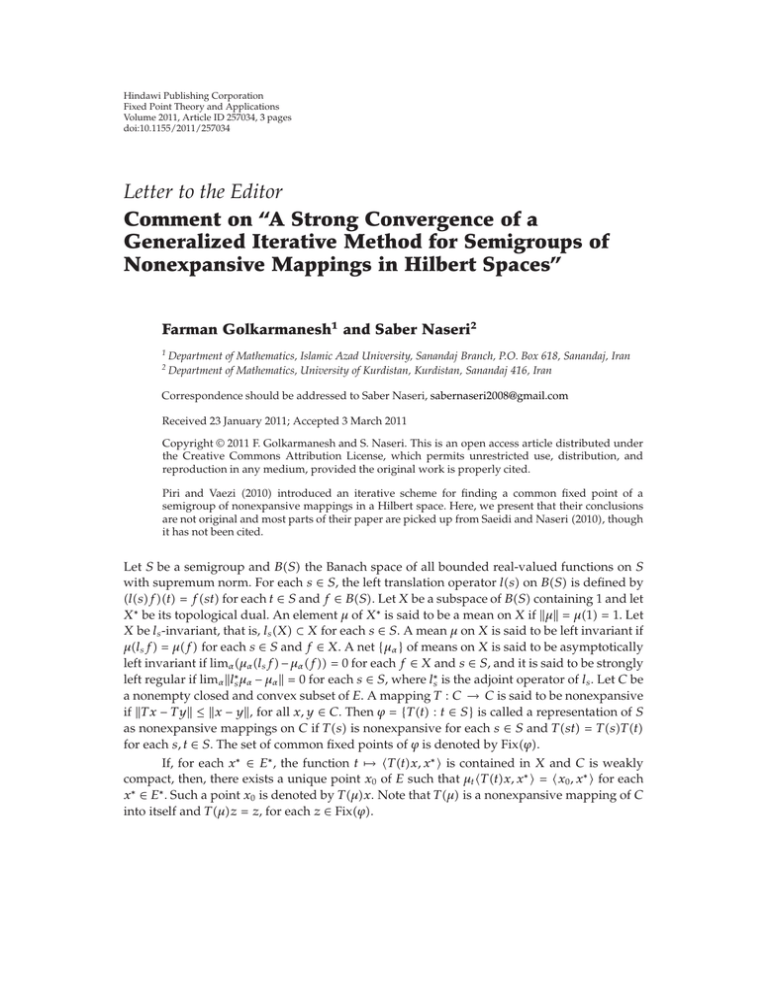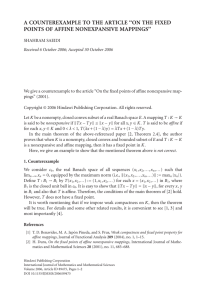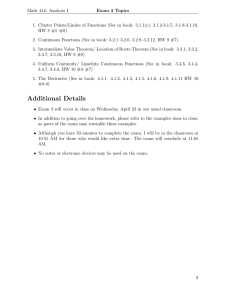Document 10884301
advertisement

Hindawi Publishing Corporation
Fixed Point Theory and Applications
Volume 2011, Article ID 257034, 3 pages
doi:10.1155/2011/257034
Letter to the Editor
Comment on “A Strong Convergence of a
Generalized Iterative Method for Semigroups of
Nonexpansive Mappings in Hilbert Spaces”
Farman Golkarmanesh1 and Saber Naseri2
1
2
Department of Mathematics, Islamic Azad University, Sanandaj Branch, P.O. Box 618, Sanandaj, Iran
Department of Mathematics, University of Kurdistan, Kurdistan, Sanandaj 416, Iran
Correspondence should be addressed to Saber Naseri, sabernaseri2008@gmail.com
Received 23 January 2011; Accepted 3 March 2011
Copyright q 2011 F. Golkarmanesh and S. Naseri. This is an open access article distributed under
the Creative Commons Attribution License, which permits unrestricted use, distribution, and
reproduction in any medium, provided the original work is properly cited.
Piri and Vaezi 2010 introduced an iterative scheme for finding a common fixed point of a
semigroup of nonexpansive mappings in a Hilbert space. Here, we present that their conclusions
are not original and most parts of their paper are picked up from Saeidi and Naseri 2010, though
it has not been cited.
Let S be a semigroup and BS the Banach space of all bounded real-valued functions on S
with supremum norm. For each s ∈ S, the left translation operator ls on BS is defined by
lsft fst for each t ∈ S and f ∈ BS. Let X be a subspace of BS containing 1 and let
X ∗ be its topological dual. An element μ of X ∗ is said to be a mean on X if μ μ1 1. Let
X be ls -invariant, that is, ls X ⊂ X for each s ∈ S. A mean μ on X is said to be left invariant if
μls f μf for each s ∈ S and f ∈ X. A net {μα } of means on X is said to be asymptotically
left invariant if limα μα ls f − μα f 0 for each f ∈ X and s ∈ S, and it is said to be strongly
left regular if limα ls∗ μα − μα 0 for each s ∈ S, where ls∗ is the adjoint operator of ls . Let C be
a nonempty closed and convex subset of E. A mapping T : C → C is said to be nonexpansive
if Tx − Ty ≤ x − y, for all x, y ∈ C. Then ϕ {Tt : t ∈ S} is called a representation of S
as nonexpansive mappings on C if Ts is nonexpansive for each s ∈ S and Tst TsTt
for each s, t ∈ S. The set of common fixed points of ϕ is denoted by Fixϕ.
If, for each x∗ ∈ E∗ , the function t → Ttx, x∗ is contained in X and C is weakly
compact, then, there exists a unique point x0 of E such that μt Ttx, x∗ x0 , x∗ for each
x∗ ∈ E∗ . Such a point x0 is denoted by Tμx. Note that Tμ is a nonexpansive mapping of C
into itself and Tμz z, for each z ∈ Fixϕ.
2
Fixed Point Theory and Applications
Recall that a mapping F with domain DF and range RF in a normed space E is
called δ-strongly accretive if for each x, y ∈ DF, there exists jx − y ∈ Jx − y such that
2
Fx − Fy, j x − y ≥ δx − y
for some δ ∈ 0, 1.
1
F is called λ-strictly pseudocontractive if for each x, y ∈ DF, there exists jx − y ∈ Jx − y
such that
2
2
Fx − Fy, j x − y ≤ x − y − λx − y − Fx − Fy ,
2
for some λ ∈ 0, 1.
In 1, Saeidi and Naseri established a strong convergence theorem for a semigroup of
nonexpansive mappings, as follows.
Theorem 1 Saeidi and Naseri 1. Let {Tt : t ∈ S} be a nonexpansive semigroup on H
such that Fϕ / . Let X be a left invariant subspace of BS such that 1 ∈ X, and the function
t → Ttx, y
is an element of X for each x, y ∈ H. Let {μn } be a left regular sequence of means on
X and let {αn } be a sequence in 0, 1 such that αn → 0 and ∞
n0 αn ∞. Let x0 ∈ H, 0 < γ < γ/α
and let {xn } be generated by the iterative algorithm
xn1 αn γ fxn I − αn AT μn xn ,
n ≥ 0,
3
where: H → H is a contraction with constant 0 ≤ α < 1 and A : H → H is strongly positive with
constant γ > 0 (i.e., Ax, x
≥ γ x2 , for all x ∈ H). Then, {xn } converges in norm to x∗ ∈ Fixϕ
which is a unique solution of the variational inequality A − γ fx∗ , x − x∗ ≥ 0, x ∈ Fixϕ.
Equivalently, one has PFixϕ I − A γ fx∗ x∗ .
Afterward, Piri and Vaezi 2 gave the following theorem, which is a minor variation
of that given originally in 1, though they are not cited 1 in their paper.
Theorem 2 Piri and Vaezi 2. Let {Tt : t ∈ S} be a nonexpansive semigroup on H such that
Fϕ / . Let X be a left invariant subspace of BS such that 1 ∈ X, and the function t → Ttx, y
is an element of X for each x, y ∈ H. Let {μn } be a left regular sequence of means on X and let {αn }
be a sequence in 0, 1 such that αn → 0 and ∞
n0 αn ∞. Let x0 ∈ H and {xn } be generated by the
iteration algorithm
xn1 αn γ fxn I − αn FT μn xn ,
n ≥ 0,
4
where: H → H is a contraction with constant 0 ≤ α < 1 and F : H → H is δ-strongly
accretive
and λ-strictly pseudocontractive with 0 ≤ δ, λ < 1, δ λ > 1 and γ ∈ 0, 1 − 1 − δ/λ/α.
Then, {xn } converges in norm to x∗ ∈ Fixϕ which is a unique solution of the variational inequality
F − γ fx∗ , x − x∗ ≥ 0, x ∈ Fixϕ. Equivalently, one has PFixϕ I − F γ fx∗ x∗ .
The following are some comments on Piri and Vaezi’s paper.
i It is well known that for small enough αn ’s, both of the mappings I − αn A and
I − αn F in Theorems 1 and 2 are contractive with constants 1 − αn γ and 1 − αn 1 −
Fixed Point Theory and Applications
3
1 − δ/λ, respectively. In fact what differentiates the proofs of these theorems is
their use of different constants, and the whole proof of Theorem 1 has been repeated
for Theorem 2.
ii In Hilbert spaces, accretive operators are called monotone, though, it has not been
considered, in Piri and Vaezi’s paper.
iii Repeating the proof of Theorem 1, one may see that the same result holds for
a strongly monotone and Lipschitzian mapping. A λ-strict pseudocontractive
mapping is Lipschitzian with constant 1 1/λ.
iv The proof of Corollary 3.2 of Piri and Vaezi’s paper is false. To correct, one may
impose the condition A ≤ 1.
v The constant γ , used in Theorem 2, should be chosen in 0, 1 − 1 − δ/λ/α.
References
1 S. Saeidi and S. Naseri, “Iterative methods for semigroups of nonexpansive mappings and variational
inequalities,” Mathematical Reports, vol. 1262, no. 1, pp. 59–70, 2010.
2 H. Piri and H. Vaezi, “A strong convergence of a generalized iterative method for semigroups of
nonexpansive mappings in Hilbert spaces,” Fixed Point Theory and Applications, vol. 2010, Article ID
907275, 16 pages, 2010.


